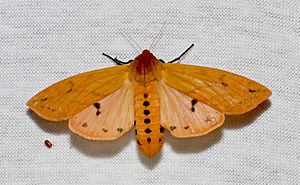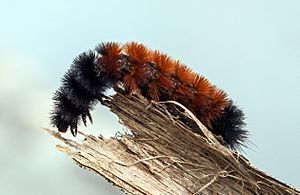Isabella tiger moth facts for kids
Quick facts for kids Isabella tiger moth |
|
|---|---|
 |
|
| Adult | |
 |
|
| Woollybear caterpillar | |
| Scientific classification | |
| Synonyms | |
|
The Isabella tiger moth (Pyrrharctia isabella) is a fascinating insect. It lives in cool and cold northern areas, including the Arctic. This moth is most famous for its caterpillar, known as the banded woollybear.
This fuzzy caterpillar has an amazing superpower: it can freeze solid during winter! It makes a special fluid in its body. This fluid helps protect its tissues from damage when it gets super cold. When spring arrives, the woollybear thaws out. It then leaves its winter hiding spot, eats, and grows.
Contents
Life Cycle of the Isabella Tiger Moth
The Isabella tiger moth's life cycle changes depending on where it lives.
Life in Temperate Climates
In places with a temperate climate, like most parts of North America, these moths usually have one or two groups of babies (called "broods") each year. This means they can complete their full life cycle from egg to adult moth once or twice in a single warm season.
Life in the Arctic
In the Arctic, the warm season is very short. Because of this, a woollybear caterpillar needs several summers to grow big enough. It will feed and grow during the short summer months. Then, each winter, it freezes solid. It might go through many winters before it finally changes into a pupa. After that, it becomes an adult moth.
Some woollybear caterpillars from other species can even live through as many as 14 winters! After all that time, they finally become an adult moth. The adult moths only live for a few days, just long enough to find a mate and lay eggs.
Images for kids
See also
 In Spanish: Pyrrharctia isabella para niños
In Spanish: Pyrrharctia isabella para niños






